Construction output rises 3.5% year-on-year, with new housing construction still a prominent reason for increases in output and materials price inflation
01 / KEY CHANGES
- Construction output rose 1.8% month-on-month and 3.5% year-on-year in September 2014.
- New housing construction continues to be the predominant reason for increases in new work output and materials price inflation
- Construction materials prices rose by 1.0% in the year to September
- Consumer price inflation increased to 1.3% in October, from 1.2% in September
- Construction average weekly earnings increased on a yearly basis by 2.4% for total pay and 1.3% for regular pay (three-month averages) in September
The following chart shows Aecom’s index series since 2000, reflecting cost movements in different sectors of the construction industry and consumer prices.
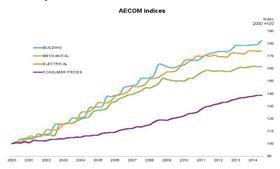

Building cost index
Building costs increased in the year to Q3 2014 by 2.2%. Wage awards effective in Q3 are the largest component of the increase.
Mechanical cost index
The rate of annual change was 0.5% at Q3 2014. Although this is an increase on Q2’s rate of annual change, it is explained by the base effects of the index in Q3 2013 which was lower than its preceding quarter last year.
Electrical cost index
The electrical cost index increased by 1.4% in Q3 2014. Again, this is due to a fall in the index between Q2 and Q3 last year, not significant increases in the present index level.
Consumer prices index
The annual consumer price inflation rate was 1.3% at October 2014. This was a small increase on September’s figure of 1.2%.
02 / PRICE ADJUSTMENT FORMULAE FOR CONSTRUCTION CONTRACTS
Price Adjustment Formulae indices, compiled by the Building Cost Information Service (previously by the Department for Business Innovation & Skills), are designed for the calculation of increased costs on fluctuating or variation of price contracts. They provide useful guidance on cost changes in various trades and industry sectors - i.e. those including labour, plant and materials - and on the differential movement of work sections in Spon’s Price Books.
The 60 building work categories recorded an average increase of 1.2% on a yearly basis.
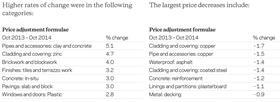
03 / SUMMARY
- The rate of consumer price inflation increases marginally in October ▲
- Manufacturing input prices approach recent historical lows ▼
- Industry output prices slip into negative territory ▼
- Metals prices in Q3 reverse gains made in Q2 ▼
Construction materials price inflation resulted predominantly from housing sector activity ▲
04 / KEY INDICATORS
Construction Industry
The All Work material price index increased by 1.0% in the year to September 2014. Materials price increases for the construction industry over the last 12 months are detailed below:

Mechanical services materials for housing fell on an annual basis at -1.0%. The index of mechanical services materials for non-housing work continues to show little change. The electrical services materials index declined by 0.5% annually in September; however, this current rate of decline slowed from changes recorded throughout 2014.
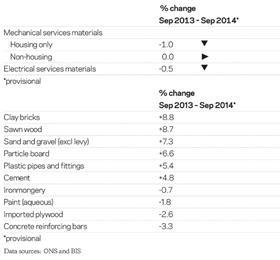
UK economy

The annual rate of consumer price inflation rose to 1.3% in October. This was a marginal increase on the figure posted in September, which was a five-year low at 1.2%.

Input prices are falling at their fastest rate since September 2009. Input prices fell 8.4% annually at October, an increased rate from that in September when prices were falling at an annual rate of 7.4%. Core input inflation, which excludes volatile items, decreased 2.7% in the year to October. The price of oil is the largest component of the decline.

Output prices of UK manufactured goods (factory gate prices) fell 0.5% in the year to October. This is the fourth consecutive fall in the index. The narrower core index, which excludes volatile items such as petroleum and food, increased 0.9% in the year to October.
Source: ONS
Metal prices

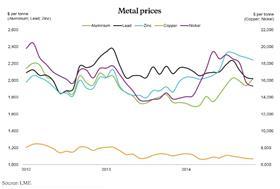
Metals prices fell in Q3 2014, reversing gains made in the second quarter of the year. Generally, average price levels on an annual basis are higher though, when compared to the same time in 2013. Copper continued its slide though.


Sterling fluctuated against the euro in the third quarter of 2014 but maintained its strength overall. The same was not true against the US dollar, where continuing dollar strength saw sterling fall by 7% over the quarter.
05 / LABOUR MARKET STATISTICS
- In September 2014, average weekly earnings (total pay including bonuses) in construction increased to £563 from £558 in August. Annually, earnings rose 2.4% in September, using a three-month average basis. Regular pay (excluding bonuses and arrears) increased at a slower yearly rate of 1.3% on a single month comparison.
- Construction industry regular pay broadly tracked similar changes to average earnings for the whole economy. However, total pay statistics for the construction industry outstripped the same measures for the whole economy, at 2.4% and 1.0% respectively (three-month averages).
06 / WAGE AGREEMENTS
Construction Industry Joint Council
The parties to the Construction Industry Joint Council have agreed a new pay deal, which sees pay rates increase by 3% from 30 June 2014, and a further 3% rise from 29 June 2015. Travel and fare allowances also increase from 30 June 2014, along with subsistence allowances increasing to £35 a night from 6 January 2015. The agreement also addresses changes to sick pay.
Joint Council Committee of the Heating, Ventilating and Domestic Engineering Industry
A 2.5% increase in hourly wage rates comes into effect from 6 October 2014. Amendments to the basic working week also apply from the same date, as the number of hours per week reduces from 38 to 37.5. Changes to the level of weekly sickness and accident benefit are also planned.
The Joint Industry Board for the Electrical Contracting Industry
Members will receive a 2% pay rise in January 2015, followed by a 3% increase from January 2016.
Building and Allied Trades Joint Industry Council
The Building and Allied Trades Joint Industrial Council (BATJIC) recently agreed a two-year pay deal effective from 30 June 2014. The deal involves variable wage rises for the standard wage rates averaging 2.5%. A further set of rises averaging 3% come into effect from 29 June 2015. Annual holiday entitlement will increase by one day, as of 29 June 2015, from 21 days to 22 days, making a total of 30 days including public holidays.
The new BATJIC rates of wages are:

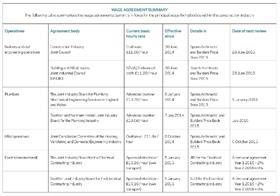







No comments yet